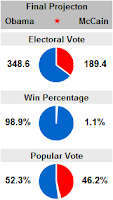
Inspired by Election Day (today!), I though that it’s time I examined voting. After all, it’s what makes democracy democracy, and empowers the common man. But there are clearly many flaws in voting, and we should closely examine them in order to improve our government.
An important aspect of voting that should probably be scrutinized is the voting process itself. The system we have in America is almost certainly flawed; it comes from a far less democratic time than today, and it has changed little since then. The most prominent flaws are the Electoral College and the “winner-take-all” scheme used in elections, which makes the “one person one vote” idea bunk. There have been many solutions proposed to amend this, the most obvious being to get rid of the Electoral College altogether.
However, representative democracy is what makes us different from many other democratic nations. Our founding fathers made the nation a representative democracy because they were afraid that a direct democracy would fall prey to “factions,” or political parties. However, today we see that even a representative democracy can fall prey to political parties. Thus, eliminating the Electoral College is probably not a bad idea.
On a similar note, in my favorite novel (The Moon is a Harsh Mistress, by Robert A. Heinlein), one of the characters suggests:
“Suppose instead of election a man were qualified for office by petition signed by four thousand citizens. He would then represent those four thousand affirmatively, with no disgruntled minority, for what would have been a minority in a territorial constituency would all be free to start other petitions or join in them. All would then be represented by men of their choice. Or a man with eight thousand supporters might have two votes in this body. Difficulties, objections, practical points to be worked out— many of them! But you could work them out…and thereby avoid the chronic sickness of representative government, the disgruntled minority which feels—correctly!—that it has been disenfranchised.”
This is a fascinating proposal (which, unfortunately, is not discussed any more than this in the novel), and it would be interesting to consider the effects if it were applied to our system at one or more levels. If applied to the concept of presidential elections, the result would probably be about the same—people would most likely still support 2 major candidates, one Republican and one Democrat, so that they increase their party’s chances of winning.
In a senatorial election, though, this system would have very interesting implications (Obviously our system would have to be slightly tailored to fit). It is likely that both parties would make a list of candidates and have people support them, so that they can get as many people in the Senate as possible. However, several independents might be elected, because independent party voters from all over the country or state could support one or two candidates, rather than have a few independent voters in each state or district being eclipsed by the majority.

Overall, though, the effects would probably be minimal—the two-party structure built into our country will probably not go away very soon.
There is another point I would like to bring up, one that I feel is forgotten in American history: Which is more important, democracy or the protection of liberties? Remember that what made the US so revolutionary in 1776 was not that it was democratic but that it tried to ensure that government would never encroach on our civil liberties (I won’t say “natural rights”). As history progressed, though, this promise has been broken. We did not extend these rights to Native Americans, African-Americans, or women until recently, and I can think of countless examples of times (usually during wartime) when an act was passed that limited freedom of speech or privacy. Though this was often done without the direct consent of the people, in many cases they would have voted for the decision anyway. (We see this today with the PATRIOT Act.)
Because of all this, I think our government must always remember its roots, especially its noble pledge to respect all human beings. Though democracy is important, the majority should not be able to vote to oppress the minority.

No comments:
Post a Comment